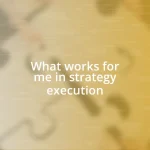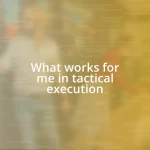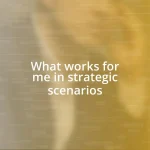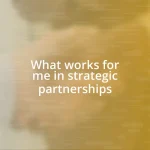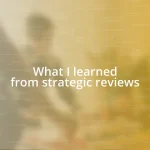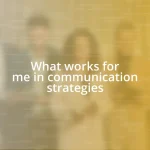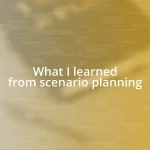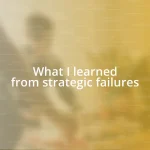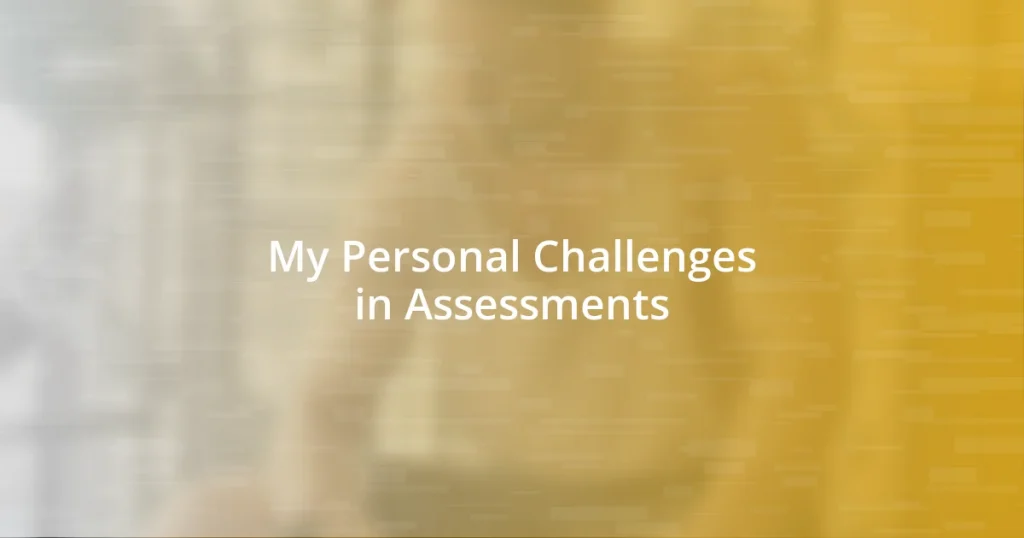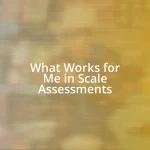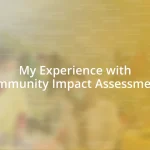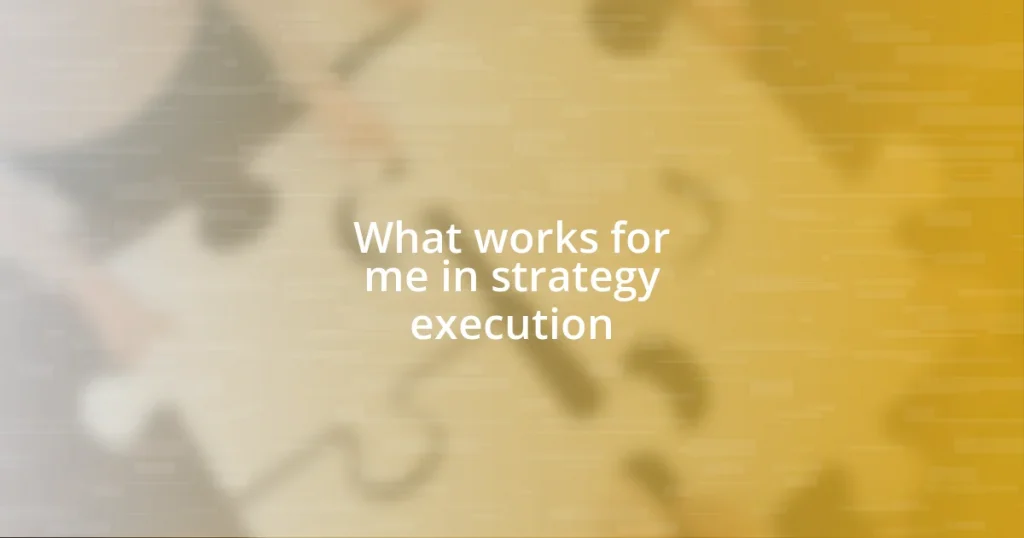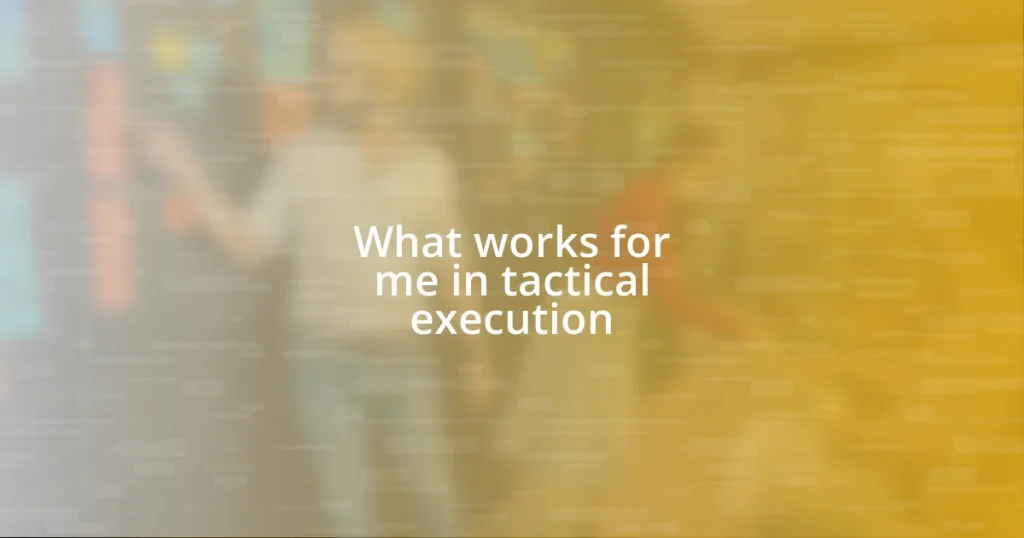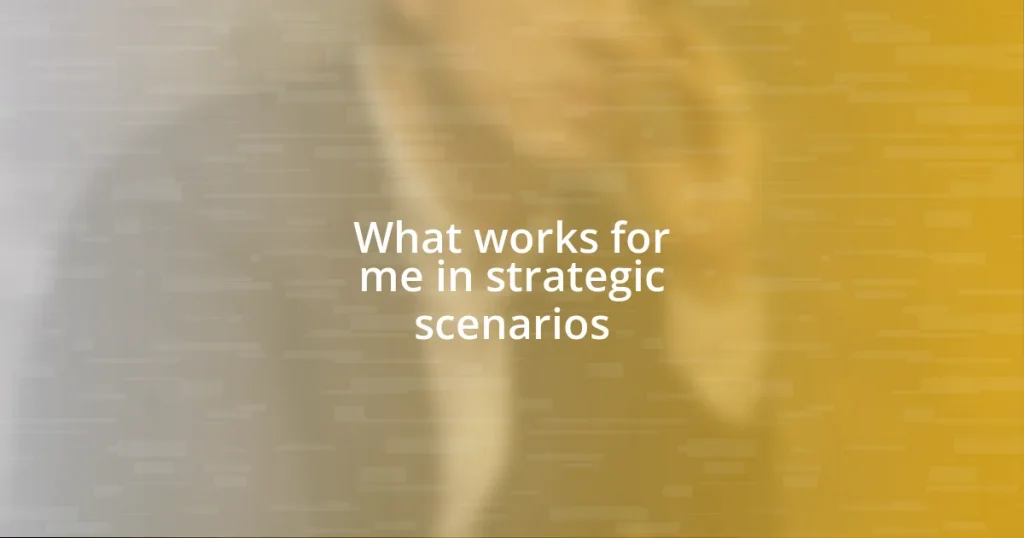Key takeaways:
- Personal challenges in assessments provide opportunities for growth when viewed through a lens of self-reflection and emotional awareness.
- Recognizing different types of assessments, such as formative and summative, allows for a more strategic approach to preparation and performance.
- Seeking support from peers and utilizing varied study resources enhance understanding and lessen the burden of assessment challenges.

Understanding personal challenges
Understanding personal challenges often starts with a deep self-reflection. I remember a time when I faced a particularly daunting assessment—it seemed like my confidence has evaporated overnight. Have you ever felt paralyzed by a task that suddenly seemed insurmountable? That experience forced me to confront not just the assessment, but my underlying fears and insecurities.
As I navigated through these challenges, I found it crucial to acknowledge my feelings. There were moments I felt overwhelmed, questioning my abilities and fearing judgment from others. Isn’t it fascinating how our minds can sometimes become our harshest critics? This realization shifted my perspective; I began to see my personal struggles as opportunities for growth, rather than barriers.
Additionally, I found that sharing my experiences with others lightened the emotional load. Conversations with friends brought out similarities in our challenges, fostering a sense of camaraderie. How often do we underestimate the power of community in overcoming personal hurdles? It’s a reminder that we’re not alone in our struggles, and understanding this interconnectedness can be profoundly comforting.

Identifying assessment types
Identifying the types of assessments can be a bit like uncovering layers of an onion—each peel reveals something new. I remember a time when I thought assessments were just tests, but as I learned more, I realized there are diverse types, each serving a unique purpose. For instance, formative assessments provide ongoing feedback during the learning process, helping to identify areas for improvement before the final evaluation. Meanwhile, summative assessments look at the knowledge gained after instruction, giving a clear picture of what has been learned. It’s like knowing how to navigate different paths when you have various destinations in mind.
Here’s a brief overview of assessment types to consider:
- Formative Assessments: Continuous assessments like quizzes and class discussions that provide ongoing feedback.
- Summative Assessments: Evaluations like final exams or projects that measure knowledge at the end of an instructional period.
- Diagnostic Assessments: Tools used before instruction to gauge what students already know.
- Benchmark Assessments: Periodic evaluations used to measure progress and performance against standards.
- Performance-Based Assessments: Real-world tasks that showcase students’ skills and knowledge application.
Recognizing these different types empowered me to approach my challenges more strategically. Instead of feeling overwhelmed by assessments, I started viewing them as opportunities to demonstrate my understanding and growth. It’s amazing how this shift in perspective can transform a daunting experience into a valuable learning moment.

Analyzing emotional responses
Analyzing emotional responses in assessments can reveal a lot about our inner workings. I vividly recall staring at an exam paper, my heart racing and palms sweaty, almost feeling the physical weight of my anxiety pressing down on me. Have you ever been in such a situation where your emotions just seem to overtake your rational thinking? I realized that recognizing these feelings is the first step towards managing them, which is essential during assessments.
As I unraveled my emotional responses, I discovered that anxiety often masked excitement. It took time for me to understand how tightly intertwined these emotions can be. For example, I remember preparing for a major presentation, where I felt nervous, but once I shifted my mindset to see it as an opportunity to share my knowledge, a surge of confidence replaced the fear. Isn’t it intriguing how a simple change in perspective can fuel our emotional resilience?
Analyzing emotional triggers can also offer insight into performance patterns. I began to jot down my feelings before and after assessments, which illuminated a connection between my emotions and my outcomes. I noticed that when I felt at ease and confident, my performance soared, whereas self-doubt often led to less favorable results. This reflection not only guided how I prepared for evaluations but also helped me cultivate a more positive mindset.
| Emotional Response | Impact on Performance |
|---|---|
| Anxiety | Tends to hinder focus and increases mistakes |
| Excitement | Enhances engagement and promotes peak performance |
| Self-Doubt | Can sabotage confidence and result in underperformance |
| Confidence | Boosts clarity and the ability to articulate thoughts |

Strategies for overcoming challenges
When faced with challenges in assessments, I’ve found that effective preparation can make all the difference. For instance, I once tackled a particularly tough exam by forming a study group with classmates. It not only provided me with different perspectives on the material but also created a supportive atmosphere where we could encourage each other. Have you ever considered how collaboration could lighten the load of your next assessment?
Another strategy that helped me immensely was creating a personalized study plan. In one instance, I had multiple assessments due within a week, and a chaotic approach led to stress. So, I mapped out my topics, assigned specific study times, and stuck to that schedule like it was a commitment to a friend. This transformed my dread into confidence, helping me manage my time better and focus on one task at a time. Isn’t it rewarding to break challenges down into manageable pieces?
Finally, I learned the power of mindfulness before assessments. On a particularly nerve-wracking occasion, I took just five minutes to breathe deeply and visualize my success. This simple act calmed my racing thoughts and centered my focus. It made me wonder, how often do we overlook the quiet moments that can transform our anxious energy into a confident presence?

Building effective study habits
Building effective study habits starts with establishing a consistent routine that aligns with my personal learning preferences. For example, I’ve always been an early bird, so I dedicated my mornings to studying when my mind felt freshest. This routine not only set a productive tone for the day but also helped me avoid the cramming frenzy that often left me exhausted and overwhelmed. Have you ever tried studying at different times to find what works best for you?
Another pivotal point for me was the power of breaking my study sessions into shorter, focused bursts. During my time in school, I discovered the Pomodoro Technique, which involves studying for 25 minutes followed by a 5-minute break. Initially, I was skeptical, thinking I needed longer periods to really absorb the material. But I found that those short bursts kept me engaged and minimized distractions. Has anyone else experienced that refreshing clarity after a brief break?
Lastly, I’ve particularly benefitted from incorporating varied study resources, such as videos, podcasts, and flashcards, into my arsenal. Once, while preparing for a comprehensive exam, I combined reading the textbook with watching informative videos that explained complex concepts visually. This alternate approach enhanced my understanding and memory retention. Isn’t it fascinating how diversifying our study materials can open up new avenues of comprehension?

Seeking support and resources
Seeking support and resources has been a game changer in my assessment journey. I remember when I was preparing for my first major subject exam; I felt overwhelmed and unsure of where to start. A close friend suggested that I reach out to a tutor who specialized in the material. I was initially hesitant, thinking I could figure it out on my own, but connecting with that tutor opened up a world of clarity. Have you ever hesitated to ask for help, only to realize it was precisely what you needed?
In my experience, utilizing online study platforms can also be incredibly beneficial. There was a time when I struggled with a difficult topic in math and decided to explore a tutoring site that offered video tutorials. Every time I watched a lesson, I felt as if a lightbulb was flickering on in my mind. It provided instant feedback and access to resources I wouldn’t have found in my textbooks. Isn’t it amazing how technology can bridge gaps in our understanding?
Additionally, I’ve learned the value of forming connections with peers through academic forums or study groups. One instance stands out—after joining an online study community for my coursework, I was pleasantly surprised by how often people were willing to share their notes and resources. This collaborative spirit not only enriched my studying experience but also created a genuine sense of belonging. Have you ever found support in unexpected places? It’s incredible how we can uplift each other in our academic journeys.

Reflecting on assessment experiences
Reflecting on my assessment experiences often brings to mind the blend of anxiety and anticipation that accompanied each test. I remember the palpable tension in the room during my first major assessment as I clutched my pencil, unsure if I had studied enough. That nervous energy pushed me to rethink how I prepared; it became clear that understanding the material truly matters more than memorizing it. Have you experienced that buzz of nerves that triggers a deeper commitment to your studies?
I can’t help but think about the moments after receiving my results. Joyful relief washed over me when I achieved a score higher than I expected, confirming that my late-night study sessions had paid off. However, there were also moments of disappointment, where I realized that a lack of preparation had led to unmet expectations. Those experiences have taught me resilience and the importance of reviewing performance to better inform my future strategies. Isn’t it intriguing how each grade can serve as a stepping stone, shaping our growth as learners?
Engaging in reflective practice opened new avenues for personal and academic development. I recall journaling about my assessment experiences, capturing not just the outcomes but the self-discovery they instigated. This practice has helped me identify patterns in my approach—what worked, what didn’t, and why. How often do we pause to reflect on our own journeys? This ongoing conversation with myself has been invaluable in aligning my efforts with my goals.
